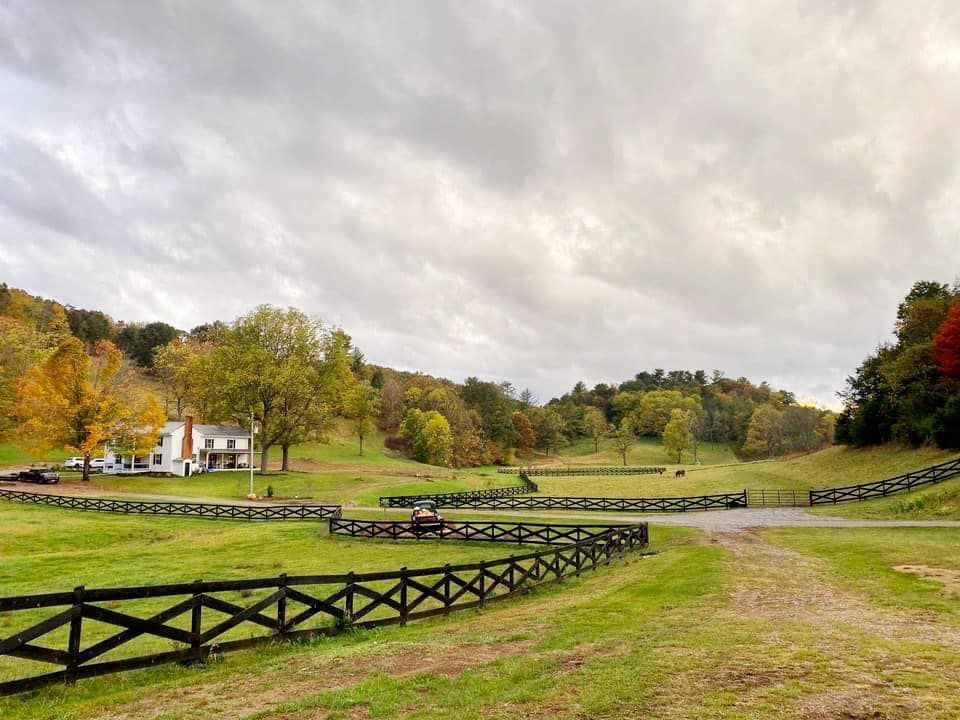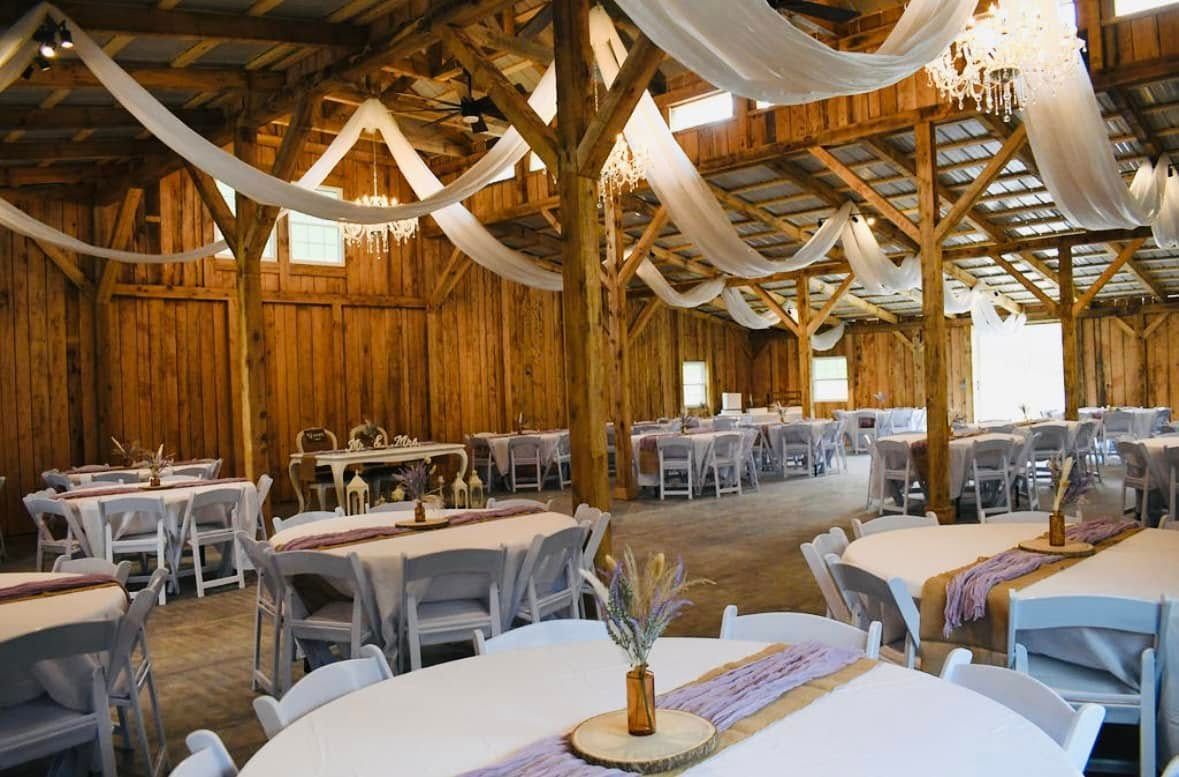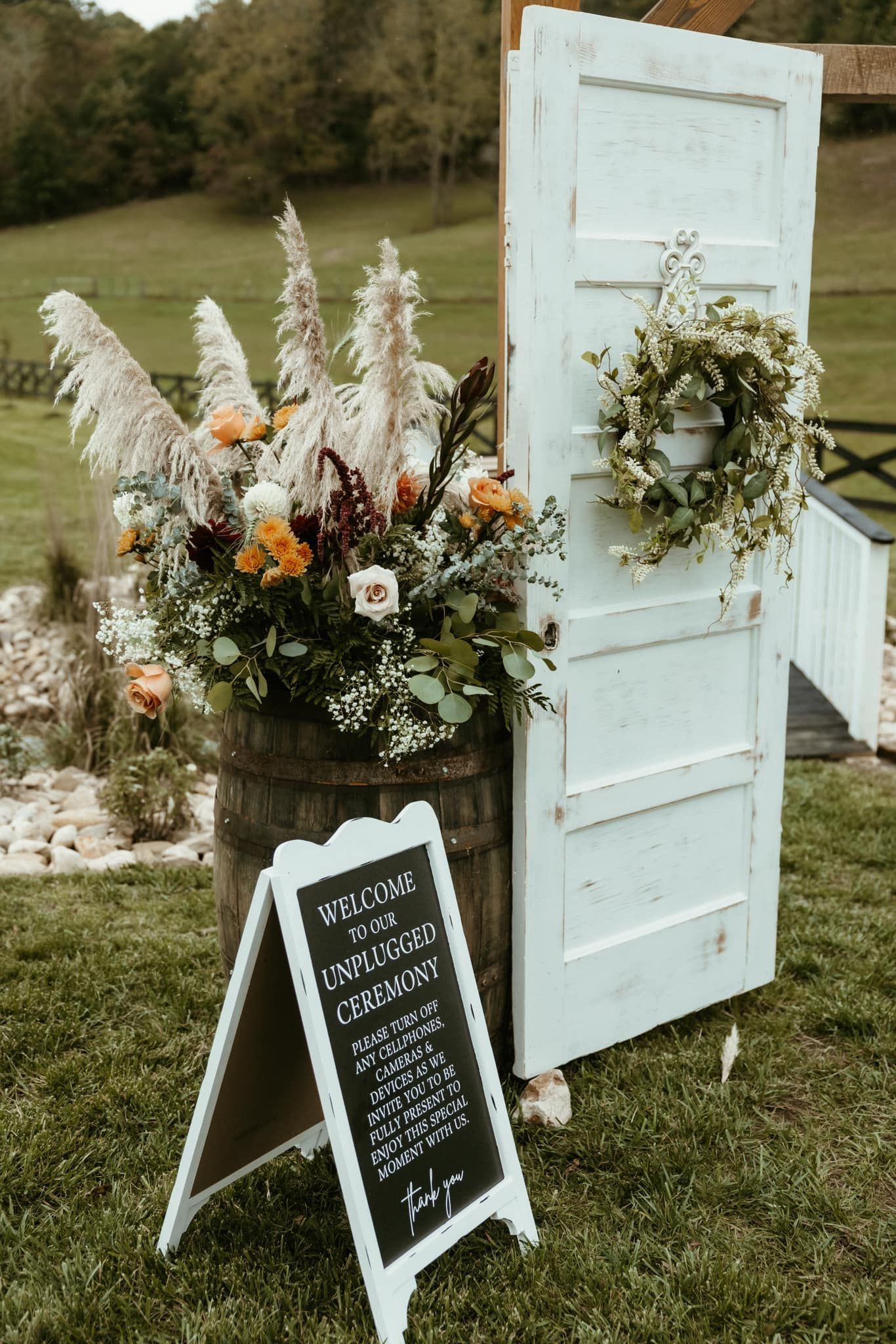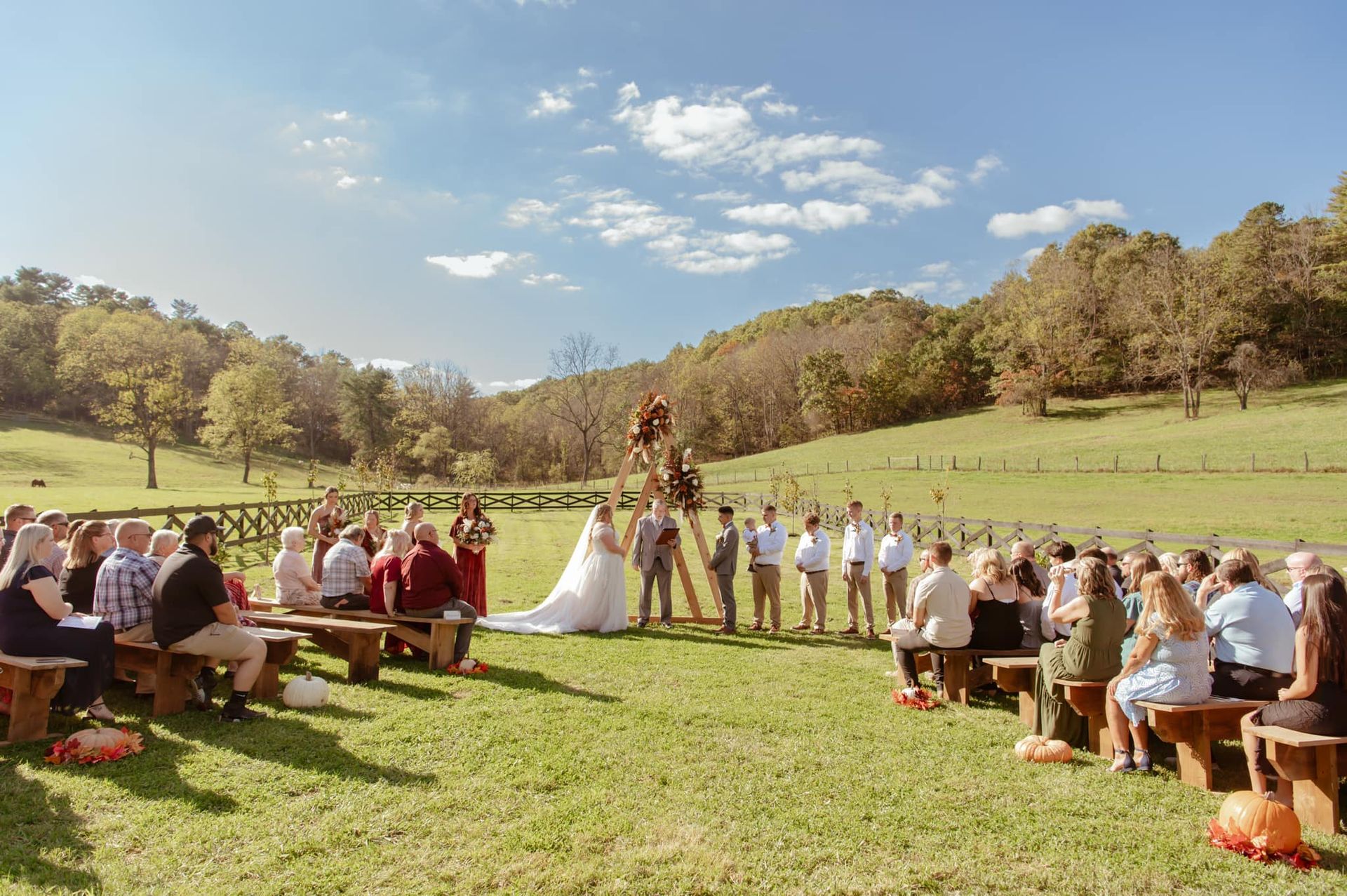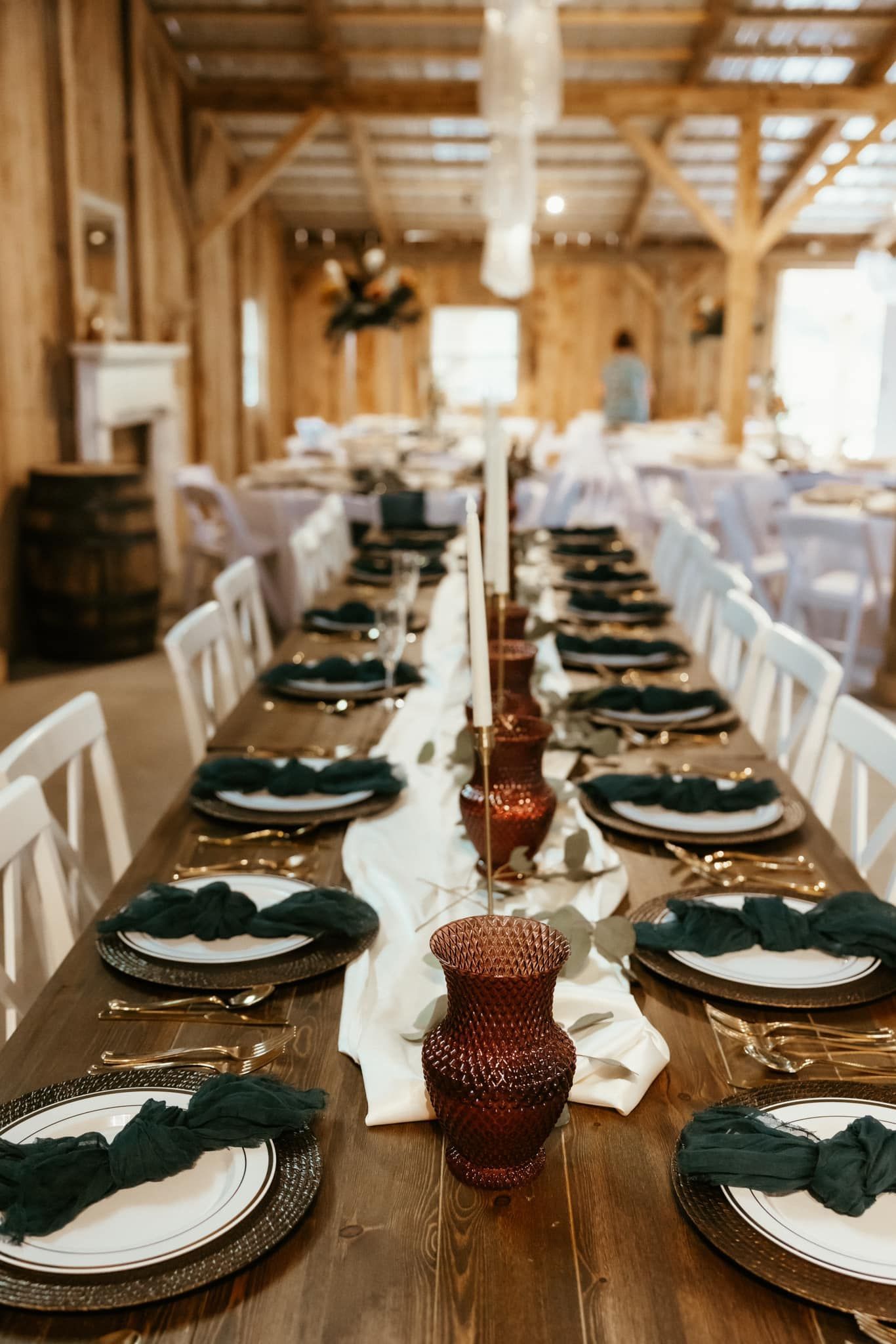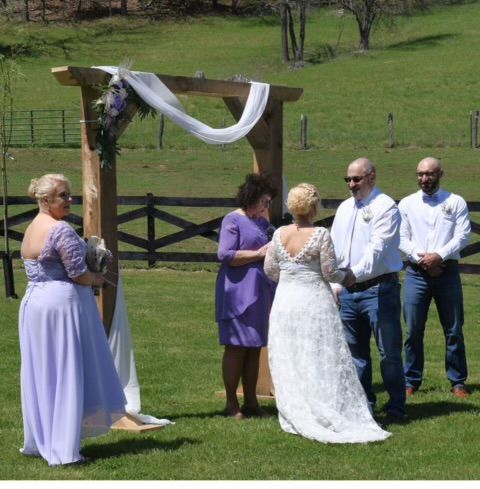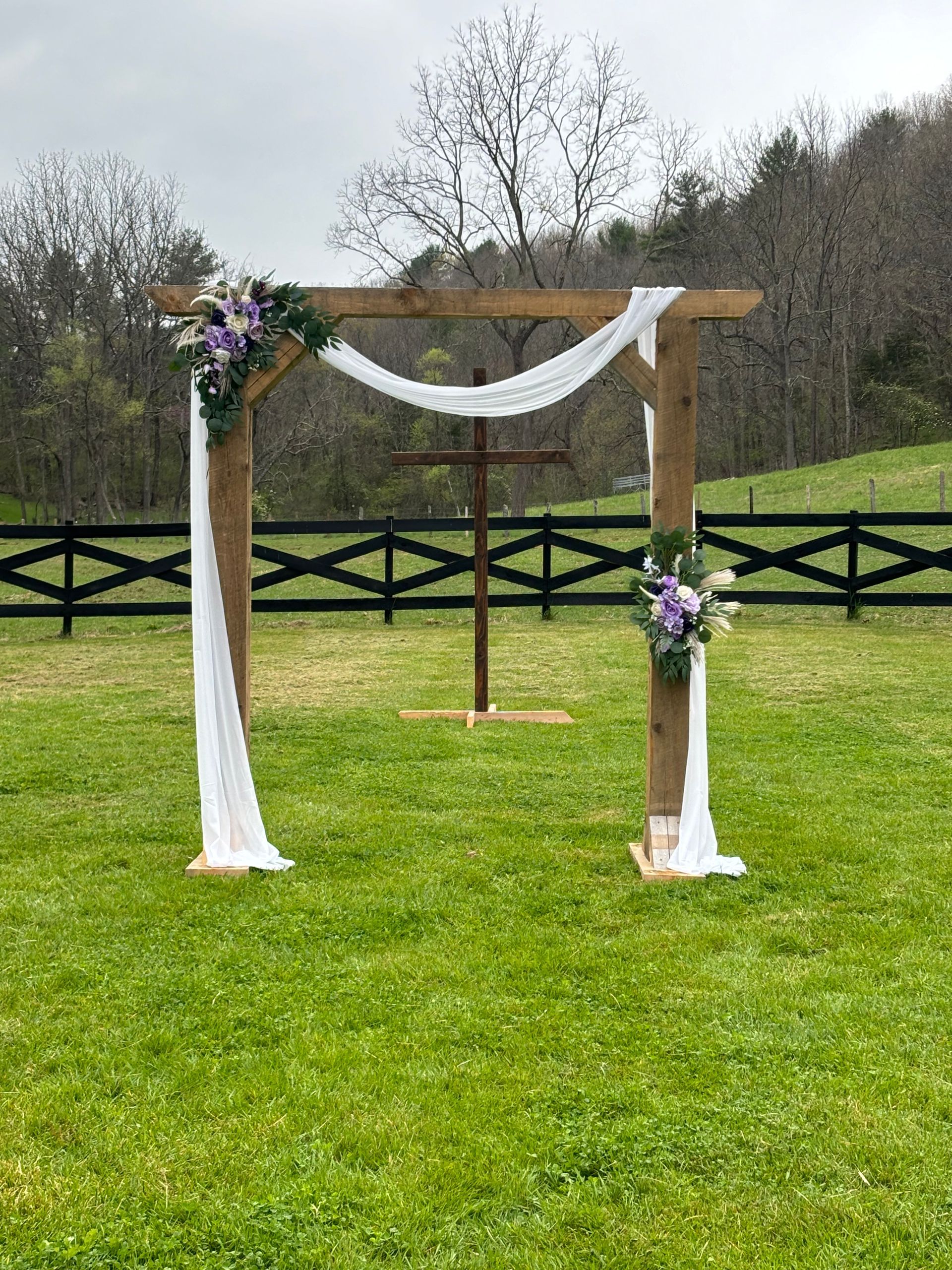How to Plan a Wedding? Step by Step Guide
Smith Creek Farms • May 2, 2024
Wedding planning requires meticulous attention to detail and careful organization. From setting a budget to selecting the perfect venue, every decision plays a crucial role in creating a memorable day for the couple and their guests. With so many components to consider, having a step-by-step guide ensures nothing is overlooked, allowing couples to navigate the process smoothly and confidently.
Smith Creek Farms in Christiansburg, VA, stands out as an idyllic venue for couples planning a wedding. Nestled against breathtaking mountain views, this family-owned farm offers a perfect blend of rustic charm and natural elegance. Whether exchanging vows in the picturesque outdoor ceremony space or celebrating in the beautifully renovated barn, couples can create unforgettable moments in this stunning setting.
In this blog, we'll provide a comprehensive outline for planning a wedding, covering essential steps from establishing a budget to sending thank-you notes. By following this guide, couples can confidently navigate the wedding planning process and focus on creating cherished memories that will last a lifetime. At the end of this blog, you will feel empowered to tackle each step of planning your dream wedding with ease and excitement.
Let's get started!
5 Essential Wedding Planning Components
Planning a wedding involves several crucial components that must be carefully coordinated to ensure a seamless and memorable event. From managing guest lists to selecting vendors and arranging attire, each aspect plays a pivotal role in creating the perfect day. Let's delve into the five essential components of planning a wedding:
1. Guest List Management
Planning a wedding involves meticulously managing the guest list. Begin by compiling a list of desired attendees, then finalize the count and address any potential issues. It's crucial to communicate effectively to avoid misunderstandings or oversights. Managing the guest list involves not only determining who will be invited but also keeping track of RSVPs, dietary restrictions, and seating arrangements. Clear communication with guests ensures that everyone feels included and valued on your special day.
2. Coordination of Wedding Party
Selecting and coordinating the wedding party is a pivotal aspect of planning a wedding. Choose bridesmaids and groomsmen, assign roles, and ensure everyone is on the same page regarding attire and responsibilities. The wedding party plays an essential role in supporting the bride and groom throughout the planning process and on the wedding day itself. Effective coordination ensures that everyone is well-prepared and able to fulfill their duties, contributing to the overall success of the event.
3. Vendor Selection and Coordination
Vendor selection and coordination play a vital role in planning a wedding. Research and choose reputable vendors, review contracts, and confirm bookings to ensure a seamless experience on the big day. From photographers and florists to caterers and musicians, each vendor contributes to the atmosphere and experience of the wedding. Clear communication and attention to detail when coordinating with vendors help to avoid misunderstandings and ensure that your vision is brought to life.
4. Wedding Attire Arrangements
Arranging wedding attire is paramount in planning a wedding. From selecting the perfect gown and suit to scheduling fittings and alterations, attention to detail is key to looking and feeling your best on the wedding day. Start early to allow ample time for browsing, fittings, and any necessary alterations. Coordinate with members of the wedding party to ensure that everyone's attire complements the overall theme and style of the wedding. Well-coordinated attire adds to the beauty and elegance of the occasion, creating lasting memories for all involved.
5. Ceremony and Reception Planning
Planning the ceremony and reception requires careful consideration. From structuring the ceremony and designing the reception layout to arranging transportation and finalizing details, thorough planning ensures a memorable and enjoyable event for all. Consider the flow of the day, incorporating meaningful rituals and traditions that reflect your personalities and values as a couple. Pay attention to logistics such as seating arrangements, audiovisual equipment, and timing to ensure that everything runs smoothly on the day of the wedding. With thoughtful planning, your ceremony and reception will be unforgettable celebrations of love and commitment.
6 Steps to Plan a Successful Wedding

Planning a wedding can be both exhilarating and overwhelming. It's a significant milestone in anyone's life, marked by love, commitment, and celebration. However, the process of planning a wedding requires careful attention to detail and thorough organization to ensure that everything runs smoothly on the big day. In this comprehensive guide, we'll outline six essential steps to help you plan a successful wedding from start to finish.
Step 1: Establish Your Budget
The first step in planning a wedding is to establish your budget. Without a clear understanding of your financial constraints, it's easy to overspend and find yourself in a stressful situation later on. Sit down with your partner and any other relevant parties to determine how much you're willing to spend on the various aspects of your wedding. Consider factors such as venue rental, catering, attire, decorations, and entertainment. Once you have a budget in place, stick to it as closely as possible throughout the planning process.
Step 2: Create a Timeline
Creating a timeline is crucial for staying organized and ensuring that you complete all necessary tasks leading up to your wedding day. Start by setting your wedding date, taking into account any important considerations such as seasonality, availability of venues, and personal preferences. From there, work backward to establish deadlines for booking vendors, sending out invitations, and completing other essential tasks. Having a clear timeline will help you stay on track and avoid last-minute stressors.
Step 3: Decide on the Size and Style of Your Wedding
The size and style of your wedding will influence many aspects of the planning process, from the choice of venue to the selection of decorations and attire. Discuss with your partner what type of wedding you envision, whether it's an intimate gathering with close family and friends or a lavish affair with hundreds of guests. Consider factors such as budget, personal preferences, and cultural or religious traditions when making this decision. Once you have a clear idea of the size and style of your wedding, you can begin to make more detailed plans.
Step 4: Choose a Wedding Date and Venue
Selecting a wedding date and venue is one of the most critical decisions you'll make during the planning process. Begin by narrowing down potential dates based on factors such as availability of key vendors, seasonality, and personal preferences. Once you've chosen a date, start researching potential venues that align with your vision for your wedding. Consider factors such as location, capacity, amenities, and cost when evaluating venues. Once you've found the perfect venue, book it as soon as possible to secure your date.
Step 5: Create Your Guest List
Creating a guest list is an essential step in planning a wedding, as it will dictate many aspects of your event, from the size of your venue to the amount of food and seating required. Begin by making a list of everyone you would like to invite to your wedding, including family members, friends, and any other important individuals. Once you have a preliminary list, go through it carefully and consider factors such as budget, venue capacity, and personal relationships when making final decisions. Remember that it's okay to be selective about who you invite, especially if you're working with limited space or budget constraints.
Step 6: Hire Vendors and Finalize Details
With your budget, timeline, venue, and guest list in place, it's time to start hiring vendors and finalizing the details of your wedding. Begin by researching and selecting vendors such as photographers, caterers, florists, and entertainment providers. When evaluating potential vendors, be sure to read reviews, ask for references, and schedule meetings to discuss your vision for your wedding. Once you've chosen your vendors, review and negotiate contracts, and make any necessary adjustments before signing on the dotted line. With your vendors secured, you can begin to finalize details such as menu selections, floral arrangements, and music playlists, ensuring that everything is in place for your big day.
Benefits of Well Planned Wedding
Planning a wedding is a monumental task that requires careful consideration and attention to detail. A well-planned wedding can alleviate stress, ensure everything runs smoothly, and create lasting memories for the couple and their guests. Let's explore the benefits of planning a wedding thoroughly.
Minimize Stress
Planning a wedding can be stressful, but with proper planning, couples can minimize stress levels significantly. By establishing a budget, creating a timeline, and making decisions early on, couples can avoid last-minute scrambles and uncertainties. Knowing that everything is organized and under control allows couples to relax and enjoy the process leading up to their big day.
Stay Within Budget
One of the biggest concerns for couples planning a wedding is staying within budget. A well-thought-out plan helps couples allocate funds efficiently, prioritize essential aspects of the wedding, and avoid overspending. By carefully considering each expense and negotiating with vendors, couples can ensure they get the most value for their money without exceeding their budget.
Ensure Smooth Execution
Effective planning ensures that everything runs smoothly on the wedding day. By finalizing details with vendors, creating a comprehensive timeline, and coordinating with the wedding party, couples can prevent logistical hiccups and ensure a seamless experience for themselves and their guests. From ceremony logistics to reception activities, a well-planned wedding allows couples to enjoy every moment without worrying about the details.
Personalize the Experience
A well-planned wedding provides ample opportunities for personalization, allowing couples to infuse their personalities and preferences into every aspect of the celebration. From choosing a unique theme and color scheme to selecting meaningful readings and music, couples can tailor their wedding to reflect their love story and shared interests. Personal touches enhance the overall experience for everyone involved and create cherished memories that last a lifetime.
Create Lasting Memories
Ultimately, a well-planned wedding results in a memorable and meaningful celebration that couples and their guests will treasure for years to come. By paying attention to every detail and ensuring that the day unfolds as envisioned, couples can create unforgettable moments that leave a lasting impression. From heartfelt vows and emotional speeches to joyful dance floor celebrations, a well-executed wedding is an experience that will be fondly remembered by all who attend.
Key Takeaway
Planning a wedding is an exhilarating journey that requires meticulous attention to detail. From setting a budget to selecting vendors, each step plays a crucial role in creating the perfect day. Begin by establishing a budget, creating a timeline, and choosing a venue that aligns with your vision. Once these foundational elements are in place, it's time to focus on essential components such as the guest list, wedding party, and vendors.
The guest list sets the tone for the event, so carefully curate it to ensure a memorable celebration with your nearest and dearest. Selecting the wedding party is another vital aspect, as they will play key roles in supporting you throughout the planning process and on the big day itself. Additionally, choosing reputable vendors who understand your vision and budget is paramount to bringing your dream wedding to life.
As the wedding day approaches, finalize all arrangements, coordinate with the wedding party, and prepare for any last-minute details. On the big day, relax and enjoy every moment knowing that you've planned meticulously. Remember to cherish the memories and celebrate your love with family and friends. Contact Smith Creek Farms in Christiansburg, a family-owned venue offering breathtaking mountain views for an unforgettable wedding experience.
